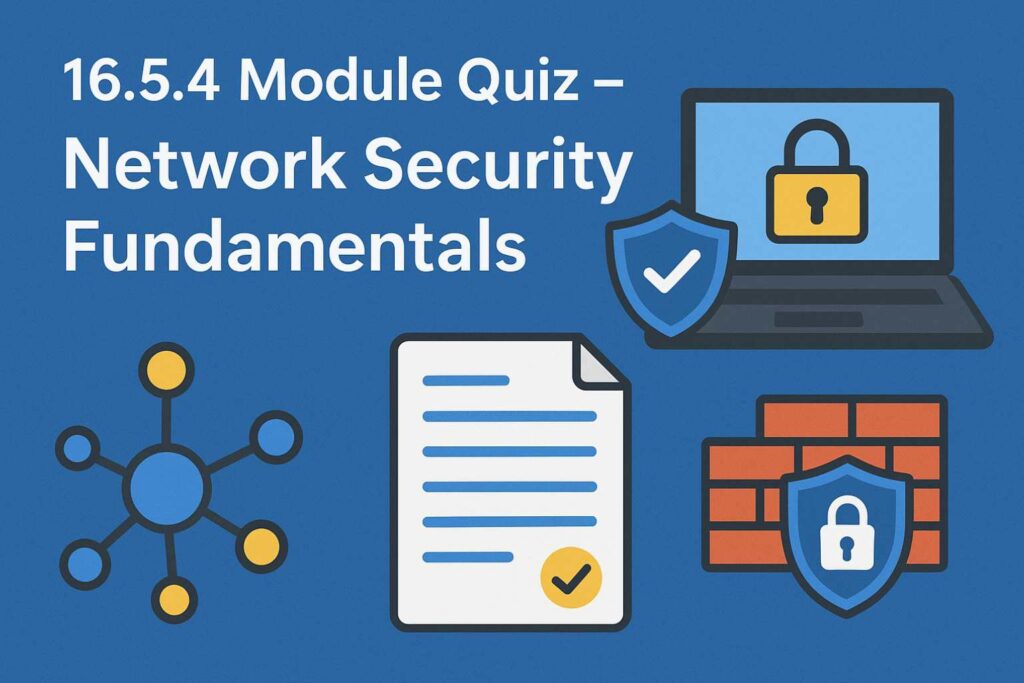Introduction to 16.5.4 Module Quiz – Network Security Fundamentals
The 16.5.4 Module Quiz is designed to test your understanding of the core principles of network security. It’s not just about memorizing definitions—it’s about applying security fundamentals to real-world situations. In today’s digital era, where cyber threats are on the rise, mastering these concepts is more important than ever.
Understanding the Purpose of the Module Quiz
The main goal of this quiz is to ensure you can identify, analyze, and prevent network security threats. It evaluates your grasp of technical concepts, security protocols, and best practices so that you can safeguard networks effectively.
Importance of Network Security Knowledge in Today’s World
We live in a hyper-connected society where almost everything—from business transactions to personal communications—happens online. A single breach can cost millions, damage reputations, and even endanger lives. That’s why network security is a must-have skill for IT professionals.
Overview of Network Security Fundamentals
What is Network Security?
Definition and Core Concepts
Network security is the practice of protecting computer networks from unauthorized access, misuse, or attacks. It involves hardware, software, and policies designed to maintain a secure environment.
Why Network Security is Critical
Without proper security measures, hackers can exploit vulnerabilities to steal data, disrupt services, or cause financial loss.
Common Threats to Networks
Malware, Viruses, and Worms
These malicious programs can corrupt files, steal data, or even shut down entire systems.
Phishing Attacks and Social Engineering
Hackers trick users into revealing sensitive information through fake emails or websites.
Denial of Service (DoS) Attacks
Attackers overwhelm a system with traffic, making it unavailable to legitimate users.
Key Components Covered in the 16.5.4 Module
Network Security Principles
Confidentiality, Integrity, and Availability (CIA Triad)
-
Confidentiality: Ensures sensitive data is accessible only to authorized users.
-
Integrity: Maintains the accuracy and trustworthiness of data.
-
Availability: Keeps systems and networks accessible when needed.
Security Policies and Procedures
Role of Security Policies
These are formal rules that guide how an organization protects its information and resources.
Compliance and Legal Requirements
Many industries must follow laws like GDPR, HIPAA, or PCI-DSS to protect user data.
Network Devices and Security Features
Firewalls
Act as barriers between secure and untrusted networks, filtering incoming and outgoing traffic.
Intrusion Detection and Prevention Systems (IDS/IPS)
Monitor network activity for suspicious behavior and take action against threats.
VPNs and Secure Remote Access
Encrypt data for safe communication over public networks.
Security Protocols and Encryption
Common Network Security Protocols
HTTPS, SSL/TLS, and SSH
These protocols secure communication by encrypting data during transmission.
WPA2/WPA3 for Wi-Fi Security
Ensure that wireless networks are protected from unauthorized access.
Encryption Methods
Symmetric vs Asymmetric Encryption
-
Symmetric: Uses one key for both encryption and decryption.
-
Asymmetric: Uses a public key for encryption and a private key for decryption.
Public Key Infrastructure (PKI)
A framework for managing digital keys and certificates.
Best Practices for Network Security
-
Use strong, unique passwords and change them regularly.
-
Keep all systems updated with the latest patches.
-
Train employees to recognize phishing attempts and suspicious activities.
How to Prepare for the 16.5.4 Module Quiz
-
Review All Module Content Thoroughly – Understand every term and concept.
-
Take Practice Quizzes – They help reinforce your knowledge.
-
Understand Real-Life Applications – Relate concepts to real-world scenarios.
Conclusion
The 16.5.4 Module Quiz is more than just an academic test—it’s a step toward becoming a competent, security-conscious IT professional. By mastering these fundamentals, you not only pass the quiz but also gain the skills to defend against evolving cyber threats.
FAQs
Q1: What topics are included in the 16.5.4 Module Quiz?
It covers network security basics, threats, policies, devices, encryption, and protocols.
Q2: Is the quiz multiple-choice or practical?
Usually multiple-choice, but it may include scenario-based questions.
Q3: How can I pass the quiz easily?
Study thoroughly, take practice tests, and focus on applying concepts.
Q4: Do I need prior IT experience?
Basic IT knowledge helps, but the module is designed for all learners.
Q5: How long should I prepare for this quiz?
A few days of focused study is usually enough if you already understand the basics.




I am constantly thought about this, thanks for posting.